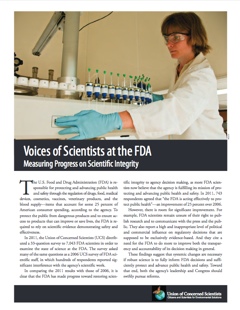A 2011 survey completed by 997 scientists at the Food and Drug Administration (FDA) suggests that agency leaders are helping to boost scientific integrity at the agency. But persistent interference by special interests continues to hinder the agency's ability to use the best available science to protect the public health.
The 33-question survey asks many of the same questions as a similar 2006 survey, also conducted by UCS, in which respondents reported significant levels of political interference in their scientific work.
This time around, it is clear that the FDA has made progress toward restoring scientific integrity to agency decision making. Twenty-five percent more respondents, for example, now agree that "the FDA is acting effectively to protect public health." Confidence in the agency's leadership is higher, and scientists report feeling more supported in their work.
However, there is room for further improvement. FDA scientists express concern on several fronts, including their right to publish research and communicate with the public, the degree of corporate and political influence on regulatory decisions, and the overall transparency and accountability of the agency's decision making.
Who responded
By coincidence, both the 2011 and 2006 surveys received responses from 997 scientists (a 14 percent and 17 percent response rate, respectively). Likewise, the survey respondents were similar in demographic and educational background, and the level of participation by managers was approximately constant (15 percent in 2006 and 13 percent in 2011).
What they said
Leadership at the FDA is stronger
The survey found that scientists in 2011 had more confidence in the future of the FDA, and more respect for their supervisors and agency leadership, than did their 2006 counterparts. They also were more likely to say that their supervisors supported them in taking potentially controversial positions and in pursuing their professional development.
Overall I have been impressed with the integrity of FDA management and that is why I continue to work here.
—A scientist from the Center for Biologics Evaluation and Research
Communication is discouraged or unclear
Scientists fear retribution for sharing concerns about the FDA, and are uncertain about their right to publish controversial work in peer-reviewed journals or to talk with the press.
Challenges to science-based decision making remain
Scientific uncertainty and disagreement, along with other factors such as the complexity of the issues, inefficient decision-making processes, and the influence of industry stakeholders, combine to delay important agency decisions.
I experience bad science decisions happening frequently and there is nothing I can do about it except leave the government.
—A scientist from the Center for Biologics Evaluation and Research
Corporate and political interference persists
Nearly a quarter of respondents had worked for an industry they were tasked with regulating, highlighting the significance of the "revolving door" problem. Substantial numbers of respondents thought that FDA decisions were overly influenced by political interests (55 percent) or business interests (40 percent). And over a third of the respondents reported firsthand experience of interference in their work in the past year.
Over my 40 years at FDA, science has been taking a greater and greater back seat to politics.
—A scientist from the Center for Food Safety and Applied Nutrition




